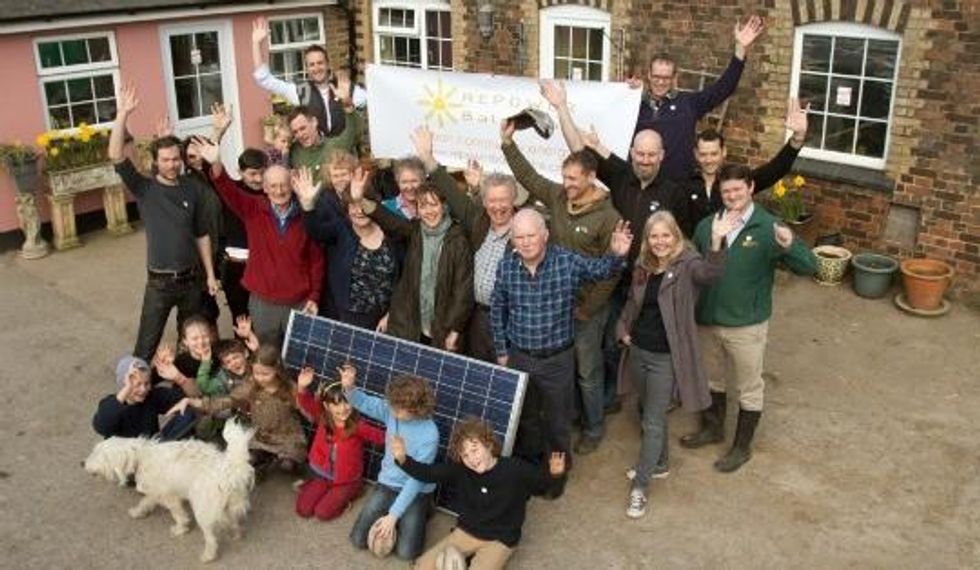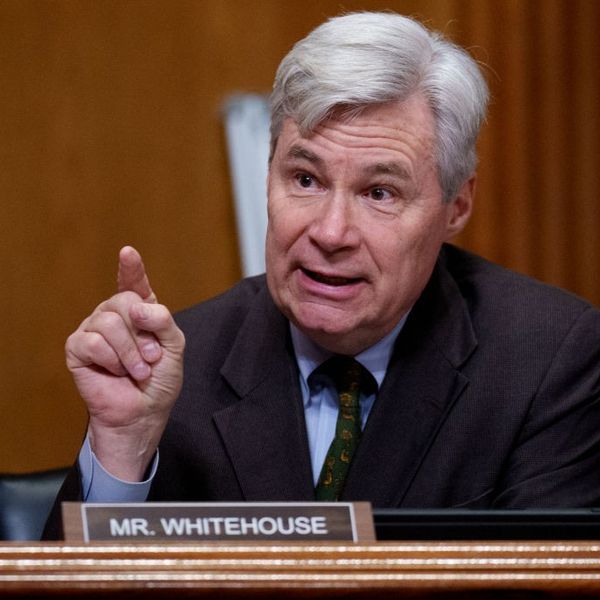Town That Shouted 'No!' to Fracking, Says 'Yes!' to Rooftop Solar
Balcombe village in the UK has seen loud and raucous protests against gas drilling, but it's real solution is as silent as the sound

But now--though the protests have died down and the drilling company Cuadrilla has at least temporarily puts its drilling hopes on hold--a new energy collaborative in the town is making a new bold statement about the energy system it wants to see.
The local group of villagers, under the name REPOWERBalcombe, has launched a community project to put rooftop solar panels on homes, barns, and other buildings in order to generate the "equivalent of 100% of Balcombe's electricity demand through community owned, locally generated renewable energy."
Their plan at the moment, according to the Guardian, is to raise an initial "PS300,000 in a community share offering for six solar arrays on roofs in and around the village that will supply 7.5% of the village's power demand."
In the longer term, however, the group hopes solar will provide all of the village's total electricity demand.
Championing the effort, their allies at Friends of the Earth-UK, say the idea is exactly what's needed in order to adequately fight the fossil fuel companies themselves and the energy and economic systems they now dominate.
"People don't need to accept risky fracking on their doorsteps," says FOE campaigner Brenda Pollack. "It's great to see community energy initiatives like this that enable local residents to produce their own clean and safe power, and earn themselves an income too."
And Tony Bosworth, writing on the FOE-UK blog, argues that this kind of proactive protest which says "Yes" to alternative energy is just one more way of saying "No" to fossil fuels. He writes:
We need to show that the claims made by the fracking industry and its supporters don't stand up to scrutiny: it's very unlikely to cut energy bills, it's not clean (the academic jury is still out on whether shale gas is cleaner than coal, but the bottom line is that it's still a fossil fuel) and it involves big risks for the local environment and human health. In short, fracking is a risk we simply do not need to take, and cannot afford to take.
We need to show that there are alternatives. And that's where Balcombe is showing the way. The local community isn't just saying no to fracking - it has launched Repower Balcombe, an initiative to install solar panels on village roofs to generate all the electricity the village needs.
Alongside community solutions we also need big-scale renewables, and that's why the announcement of a PS300 million investment in offshore wind manufacturing in Hull was a real boost.
And we need to make our voice heard by politicians. Non-violent protest is a part of this, and Friends of the Earth supports the right of people to protest peacefully.
It's not just happening in Balcombe. Wherever unconventional fossil fuel exploration is being proposed, local people are protesting - in Lancashire, Salford, Nottinghamshire and many other places. And it's great when our elected politicians themselves have the courage of their convictions to join the protests.
We know what the real answers to our energy crisis are: energy efficiency and renewables. But getting these involves saying no to false solutions such as shale gas.
Let's hope that the example of Balcombe - opposition to fossil fuel extraction coupled with support for community-based renewables - spreads far and wide.
______________________________________________
An Urgent Message From Our Co-Founder
Dear Common Dreams reader, The U.S. is on a fast track to authoritarianism like nothing I've ever seen. Meanwhile, corporate news outlets are utterly capitulating to Trump, twisting their coverage to avoid drawing his ire while lining up to stuff cash in his pockets. That's why I believe that Common Dreams is doing the best and most consequential reporting that we've ever done. Our small but mighty team is a progressive reporting powerhouse, covering the news every day that the corporate media never will. Our mission has always been simple: To inform. To inspire. And to ignite change for the common good. Now here's the key piece that I want all our readers to understand: None of this would be possible without your financial support. That's not just some fundraising cliche. It's the absolute and literal truth. We don't accept corporate advertising and never will. We don't have a paywall because we don't think people should be blocked from critical news based on their ability to pay. Everything we do is funded by the donations of readers like you. Will you donate now to help power the nonprofit, independent reporting of Common Dreams? Thank you for being a vital member of our community. Together, we can keep independent journalism alive when it’s needed most. - Craig Brown, Co-founder |

But now--though the protests have died down and the drilling company Cuadrilla has at least temporarily puts its drilling hopes on hold--a new energy collaborative in the town is making a new bold statement about the energy system it wants to see.
The local group of villagers, under the name REPOWERBalcombe, has launched a community project to put rooftop solar panels on homes, barns, and other buildings in order to generate the "equivalent of 100% of Balcombe's electricity demand through community owned, locally generated renewable energy."
Their plan at the moment, according to the Guardian, is to raise an initial "PS300,000 in a community share offering for six solar arrays on roofs in and around the village that will supply 7.5% of the village's power demand."
In the longer term, however, the group hopes solar will provide all of the village's total electricity demand.
Championing the effort, their allies at Friends of the Earth-UK, say the idea is exactly what's needed in order to adequately fight the fossil fuel companies themselves and the energy and economic systems they now dominate.
"People don't need to accept risky fracking on their doorsteps," says FOE campaigner Brenda Pollack. "It's great to see community energy initiatives like this that enable local residents to produce their own clean and safe power, and earn themselves an income too."
And Tony Bosworth, writing on the FOE-UK blog, argues that this kind of proactive protest which says "Yes" to alternative energy is just one more way of saying "No" to fossil fuels. He writes:
We need to show that the claims made by the fracking industry and its supporters don't stand up to scrutiny: it's very unlikely to cut energy bills, it's not clean (the academic jury is still out on whether shale gas is cleaner than coal, but the bottom line is that it's still a fossil fuel) and it involves big risks for the local environment and human health. In short, fracking is a risk we simply do not need to take, and cannot afford to take.
We need to show that there are alternatives. And that's where Balcombe is showing the way. The local community isn't just saying no to fracking - it has launched Repower Balcombe, an initiative to install solar panels on village roofs to generate all the electricity the village needs.
Alongside community solutions we also need big-scale renewables, and that's why the announcement of a PS300 million investment in offshore wind manufacturing in Hull was a real boost.
And we need to make our voice heard by politicians. Non-violent protest is a part of this, and Friends of the Earth supports the right of people to protest peacefully.
It's not just happening in Balcombe. Wherever unconventional fossil fuel exploration is being proposed, local people are protesting - in Lancashire, Salford, Nottinghamshire and many other places. And it's great when our elected politicians themselves have the courage of their convictions to join the protests.
We know what the real answers to our energy crisis are: energy efficiency and renewables. But getting these involves saying no to false solutions such as shale gas.
Let's hope that the example of Balcombe - opposition to fossil fuel extraction coupled with support for community-based renewables - spreads far and wide.
______________________________________________

But now--though the protests have died down and the drilling company Cuadrilla has at least temporarily puts its drilling hopes on hold--a new energy collaborative in the town is making a new bold statement about the energy system it wants to see.
The local group of villagers, under the name REPOWERBalcombe, has launched a community project to put rooftop solar panels on homes, barns, and other buildings in order to generate the "equivalent of 100% of Balcombe's electricity demand through community owned, locally generated renewable energy."
Their plan at the moment, according to the Guardian, is to raise an initial "PS300,000 in a community share offering for six solar arrays on roofs in and around the village that will supply 7.5% of the village's power demand."
In the longer term, however, the group hopes solar will provide all of the village's total electricity demand.
Championing the effort, their allies at Friends of the Earth-UK, say the idea is exactly what's needed in order to adequately fight the fossil fuel companies themselves and the energy and economic systems they now dominate.
"People don't need to accept risky fracking on their doorsteps," says FOE campaigner Brenda Pollack. "It's great to see community energy initiatives like this that enable local residents to produce their own clean and safe power, and earn themselves an income too."
And Tony Bosworth, writing on the FOE-UK blog, argues that this kind of proactive protest which says "Yes" to alternative energy is just one more way of saying "No" to fossil fuels. He writes:
We need to show that the claims made by the fracking industry and its supporters don't stand up to scrutiny: it's very unlikely to cut energy bills, it's not clean (the academic jury is still out on whether shale gas is cleaner than coal, but the bottom line is that it's still a fossil fuel) and it involves big risks for the local environment and human health. In short, fracking is a risk we simply do not need to take, and cannot afford to take.
We need to show that there are alternatives. And that's where Balcombe is showing the way. The local community isn't just saying no to fracking - it has launched Repower Balcombe, an initiative to install solar panels on village roofs to generate all the electricity the village needs.
Alongside community solutions we also need big-scale renewables, and that's why the announcement of a PS300 million investment in offshore wind manufacturing in Hull was a real boost.
And we need to make our voice heard by politicians. Non-violent protest is a part of this, and Friends of the Earth supports the right of people to protest peacefully.
It's not just happening in Balcombe. Wherever unconventional fossil fuel exploration is being proposed, local people are protesting - in Lancashire, Salford, Nottinghamshire and many other places. And it's great when our elected politicians themselves have the courage of their convictions to join the protests.
We know what the real answers to our energy crisis are: energy efficiency and renewables. But getting these involves saying no to false solutions such as shale gas.
Let's hope that the example of Balcombe - opposition to fossil fuel extraction coupled with support for community-based renewables - spreads far and wide.
______________________________________________

